4 Volumes
Revolutionary War Era
The shot heard 'round the world.
Invaders of Pennsylvania
For a peaceful state, Pennsylvania has suffered many invasions. It's all been one-way; Pennsylvania has never invaded anyone else.
Philadephia: America's Capital, 1774-1800
The Continental Congress met in Philadelphia from 1774 to 1788. Next, the new republic had its capital here from 1790 to 1800. Thoroughly Quaker Philadelphia was in the center of the founding twenty-five years when, and where, the enduring political institutions of America emerged.
History: Philadelphia and the Quaker Colonies
Philadelphia and the Quaker Colonies
Bystanders to the Revolution
It wasn't heroic to everyone.
The Wyoming Massacre of July 3, 1778
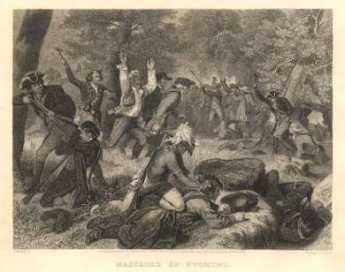
|
| The Wyoming Massacre |
The six nations of Iroquois dominated Northeastern America by the same means the Incas dominated Peru -- commanding the headwaters of several rivers, the Hudson, the Delaware, and the Susquehanna, as well as the long finger lakes of New York, leading like rivers toward Lakes Ontario and Erie. They were thus able to strike quickly by canoe over a large territory. Iroquois were quite loyal to the British because of the efforts of Sir William Johnson, who settled among them and helped them advance to quite a sophisticated civilization. It even seems likely that another fifty years of peace would have brought them to an approximately western level of culture. Aside from Johnson, who was treated as almost a God, their leader was a Dartmouth graduate named Brant.
Brant, The Noble Savage
The mixed nature of the Iroquois is illustrated by the fact, on the one hand, that Sachem Brant translated the Bible into Mohawk and traveled in England raising money for his church. On the other hand, his biographers trouble to praise him for never killing women and children with his own hands. British loyalty to these fierce but promising pupils was one of the main reasons for the 1768 proclamation forbidding colonist settlement to the West of what we now call the Appalachian Trail, which on the other hand was itself one of the main grievances of the rebellious land-speculating colonists. The Indians, for their part, saw the proclamation line as their last hope for survival. After Burgoyne's defeat at Saratoga, the Indian allies were free to, and probably urged to, attack Wyoming Valley.
It is now politically incorrect to dwell on Indian massacres, but this one was both exceptionally savage, and very close to home. The Iroquois set about systematically exterminating the rather large Connecticut sub-colony and came pretty close to doing so. Children were thrown into bonfires, women were systematically scalped and butchered. The common soldiers who survived were forced to lie on a flat rock while Queen Esther, "a squaw of political prominence, passed around the circle singing a war-song and dashing out their brains." That was for common soldiers. The officers were singled out and shot in the thigh bone so they would be available to be tortured to death after the battle. The Wyoming Massacre was a hideous event, by any standard, and it went on for days afterward, as fugitives were hunted down and outlying settlements burned to the ground.
It's pretty hard to defend a massacre of this degree of savagery, but the Indians did have a point. They quite rightly saw that white settler penetration of the Proclamation Line would inevitably lead to more penetration, and eventually to the total loss of their homeland. The defeat of a whole British Army under Burgoyne showed them that they were all alone. It was do or die, now or never. Countless other civilizations have been extinguished by provoking a remorseless revenge in preference to a meek surrender.
Sullivan's March
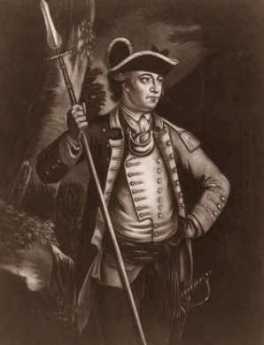
|
| Sullivan |
George Washington had plenty of other problems to contend with in 1778, but an Indian uprising led by Loyalists was too much. He singled out General John Sullivan, a celebrated Indian fighter from New Hampshire, gave him four thousand troops, and told him to eliminate this Indian threat to the Continental Army's rear, remove the safe haven for Loyalists, and assist the new Indian allies which LaFayette had befriended in the Albany area before the battle of Saratoga.
From long experience, Sullivan knew what to do, and did it without remorse. Ignoring skirmishes and ambushed sentries, he marched his troops from the scene of the massacre straight into the heart of Iroquois homeland, destroying every source of food or Indian settlement he could find. He was not interested in winning battles, he was determined to starve the Indians into extinction, once and for all. After these two slaughters, a white one in the Wyoming Valley (the Connecticut squatters in Wilkes-Barre), and now a red one in upstate New York, the entire frontier north of Pennsylvania has left a scene of devastation. Not much was heard of Indian fighting on this frontier for the rest of the Revolutionary War. Indeed, only the novels of James Fennimore Cooper make much subsequent mention of the Iroquois in American history.
William Allen, Tory
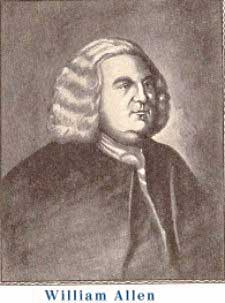
|
| William Allen |
William Allen was once famous for his expensive carriage and a team of horses, at a time when there were only eighty carriages in the colony. He was born wealthy but personally made considerable sums in maritime trade, which in those days included a mild form of piracy called privateering. Taking his accumulated wealth, he invested heavily in colonial real estate. His urban ventures included the land under Independence Hall, and his lands in the hinterland included the present town of Easton. He was a tough businessman, providing "muscle" where needed in a colony dominated by pacifist Quakers. At one point, he imported a thousand muskets and ammunition for the use of settlers in the Lehigh Valley who had difficulties with the Indians and Connecticut invaders. Allentown is named after him.
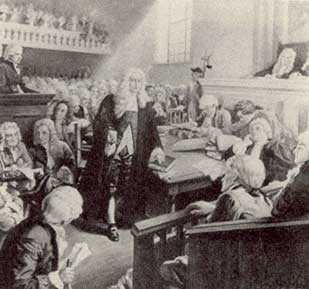
|
| Philadelphia Lawyer |
It is difficult to apply present standards of judgment to Allen. William Penn had been given the colony on condition that he protect and maintain it. That was clearly a difficult challenge for a Quaker colony in the wilderness, surrounded by Indians, French and Spanish buccaneers, and neighboring colonies who were far from pacifist themselves. The system often amounted to giving land to subcontractors like Allen, on condition that they maintain law and order. Furthermore, Allen was quite obviously a person of parts. His credentials as Chief Justice were based on his attendance at the Inns of Court when almost all other lawyers were trained by local apprenticeships. His father in law was Andrew Hamilton, the famous "Philadelphia lawyer" who won the landmark case for Peter Zenger and later became the leader of the Pennsylvania Assembly and mentor to young Benjamin Franklin. His land-dispute services in the negotiations with Lord Baltimore were notable. In general, he was a continuing force for peace and stability, and no one held it against him that peace and stability suited his needs as a landlord and merchant. To him, the battle for independence was just another unsettling disturbance which prevented the colony from achieving its potential.
His daughter married John Penn, the grandson of William Penn, who was the local representative of the Proprietors and later the Governor. All in all, it is not surprising that he retreated to his home on Germantown Avenue, called Mt. Airy, when the revolution broke out. Unlike many other Tories who fled to Canada, he felt his past services would protect him if he remained quiet and secluded until the war was over. He didn't quite make it, dying in his mansion, in 1780.
Pembertons
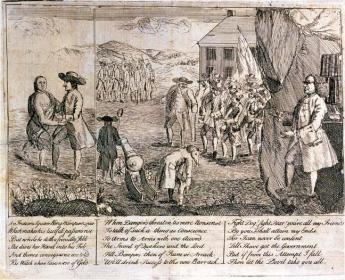
|
| Israel Pemberton, Ben Franklin satire l |
Ralph Pemberton was an English Quaker well before 1650; he may have been a Quaker before William Penn was one. As an old man, he accompanied his son Phineas to Pennsylvania in 1682. They established a farm on the banks of Delaware in Bucks County called Grove Place, and Phineas soon became one of the chief men in the colony. In the next generation, Israel Pemberton became one of the best educated, richest merchants in the colony. But it was Israel's son also called Israel, who earned the title of King of the Quakers. He was one of the founding Managers of the Pennsylvania Hospital along with Benjamin Franklin and one of his brothers, James Pemberton, and was a generous philanthropist and leader of a number of other civic organizations. Just exactly what provoked his famous political disputes with Franklin is not clear, but he was a leading friend of the Indians, whom Franklin never much liked. Israel Pemberton strongly and effectively argued William Penn's policy of friendship with the Indians, particularly insisting that sales of land to colonists should be prevented until there was a clear agreement with the Indians about the ownership. Unfortunately, pressures built up as Europeans immigrated faster than this policy could accommodate smoothly, and Franklin mostly sided with the impatient immigrants -- and squatters. This disagreement came to a head in 1756 when Pemberton negotiated a treaty of peace with the Indians at a conference at Easton. Although this treaty seemed to settle matters, it came against a background of the descendants of William Penn abandoning Quakerism. They, however, remained the proprietary owners of the Province with a more narrow focus on speeding up land sales to maximize their investment. Much of the internal dynamics of these quarrels before the Revolutionary War remain unclear and possibly somewhat misrepresented.
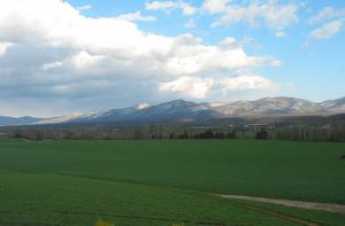
|
| Shenandoah Valley |
When the Revolution came, Pemberton viewed it with disfavor, mostly for pacifist rather than purely Tory reasons. Feelings ran high since the Pembertons were influential citizens with the potential to dissuade wavering neighbors, which made it difficult to tolerate them as invisible bystanders. However that may be, the three Pemberton brothers and twenty other wealthy and influential Quakers were arrested and, without hearing or trial, thrown in the back of an oxcart and sent into exile in Virginia for eight months. Their journey was a curious one, along a trail up the Schuylkill to the ford at Pottstown, and then down the Shenandoah Valley, an area in which they were well known and highly respected, greeted with great sympathy as they traveled. Isaac's brother John, who had spent several years as a missionary, died during this exile.
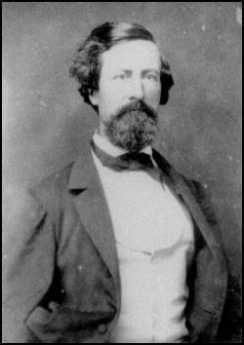
|
| John Clifford Pemberton |
In some ways, the most curiously notable Pemberton was John Clifford Pemberton, who applied to West Point on his own initiative and was appointed by Andrew Jackson who had been a friend of his father. In itself, it is curious that so combative a person and so vigorous an enemy of the Indians -- as Jackson certainly was -- would have Quaker friendships. But he did not misjudge John Clifford, who became a diligent professional warrior for his country in a number of military incidents with the Indians, the Mexicans, and the Canadians, rising to the rank of captain in the regular Army at the opening of the Civil War. In spite of personal efforts by General Winfield Scott to dissuade him, he resigned his commission and volunteered in the Confederate army. He was quickly promoted to major, then a brigadier general and eventually to Lieutenant General. As such, he was the commanding Confederate officer at the fifty-day siege of Vicksburg where he was finally forced to surrender to Grant's army. In a prisoner exchange, he was returned to the Confederate side, which they had no openings for Lieutenant Generals. He resigned and re-enlisted as a common soldier, but was quickly promoted to the rank of Colonel, in charge of the artillery at the final siege of Richmond. After the war, he became a farmer in Warrenton, Virginia, but was visiting at the family home in Penllyn when he died in 1881. John Clifford Pemberton, the highest-ranking general on the grounds, lies buried in Laurel Hill cemetery right next to Israel Pemberton. In some sort of triumph of the South, he here out-ranks George Gordon Meade, the hero of Gettysburg. Just how his pacifist family reconciled itself to his heroism can only be imagined.
Lansdowne
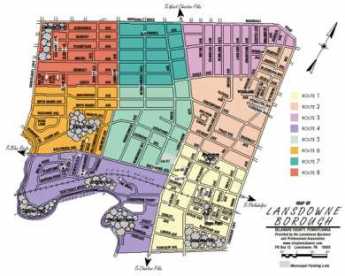
|
| Lansdowne Map |
The Granville, or Lansdowne, the family had so many members important in English history, that the Lansdowne name adorns countless schools, boroughs, colleges, museums and other monuments around the former British empire. It would require undue effort to sort out just why each memorial is named after just which member of the family. In the Philadelphia region, Lansdowne is the name of a small borough in Delaware County,
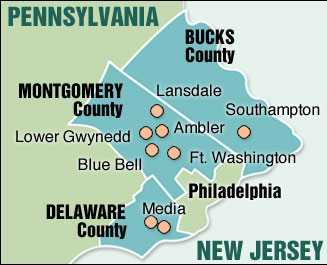
|
| Lansdale |
often annoyingly confused with Lansdale, a small borough in Montgomery County. However, it really seems more appropriate to focus reverence on the Lansdowne mansion, which from 1773 to 1795 was the home in now Fairmount Park of the last colonial Governor. That would have been John Penn, who was one of several Penns who still shared the Proprietorship until 1789, and who shared in the miserly payment which the Legislature of the new Commonwealth made as compensation for expropriating twenty-five million acres of their property. The French Revolution was going on at that time, so there were probably some patriots who would scoff that John Penn was lucky not to be guillotined.
The Penn family could see the Revolution coming, and like everyone else was uncertain who would win. Real decision-making for the Proprietorship rested with Thomas Penn in London, a close friend of the King and his ministers. The strategy employed in this difficult situation was to surrender the right to govern the colony conferred by its original charter and to become mere real estate owners with John their local representative pledging local allegiance. That might have worked for a while, until General Howe's troops captured Philadelphia. Soldiers were dispatched to Lansdowne to tell John Penn he was under detention, to reduce his potential utility to the occupying army.
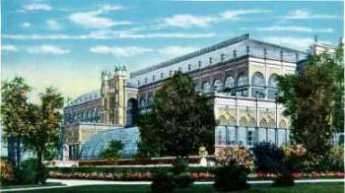
|
| Horticultural Hall |
As matters eventually worked out, some of the Penn descendants remained fairly wealthy after the Revolution, especially those whose wives had inherited substantial assets from other sources. But some were severely impoverished. The stately Georgian mansion burned down in 1854, and the site was then occupied by the Horticultural Hall of the 1876 Centennial Exposition. Perhaps because of misplaced patriotic fervor, it is now difficult to find a picture of Lansdowne.
The elegance of the place, on 140 acres, is suggested by the fact that William Bingham the richest man in America at the time, apparently acquired it from James Greenleaf the partner of Robert Morris, and the nephew by marriage of John Penn, who acquired it from Penn's estate but probably had to give it up in the financial disasters of Morris and his firm. Lansdowne was still a grand manner when it was briefly acquired by Joseph Bonaparte, the former King of Spain. In view of the fact that Bingham had provided President Jefferson with the gold to finance the Louisiana Purchase from Napoleon Bonaparte, and earlier had practically forced the Congress to call off an impending war with France, there was likely a connection here.
And to some extent, the ill-treatment which John Penn received from the Pennsylvania legislature (roughly fifteen cents an acre) in the Divestment Act of 1779 can possibly be traced to the unrelenting hatred by Benjamin Franklin, Pennsylvania's icon. History does not tell us what made these two former friends fall out in 1754, sufficient to make Franklin willing to spend years in London trying to get the colony away from the Penns. The feeling was surely mutual. When John Penn was offered the patronship of the American Philosophical Society, he declined, just because Franklin was its president. In retrospect, that sounds unwise.
Monocacy Creek and Monocacy River
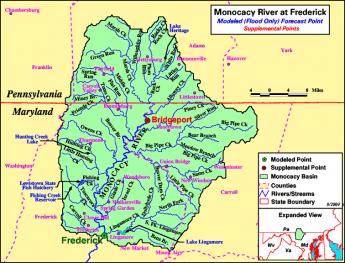
|
| Monocacy River |
Monocacy sounds like a Greek word for some form of government, but is in fact a Shawnee Indian term, meaning "crooked river". It might well be spelled as the Indians pronounced it, Monnockkesey. Confusion for history lovers is made worse by the existence of a Monocacy Creek about twenty miles long, flowing into the Lehigh River at Bethlehem. But there is a second stream, the Monocacy River, flowing about sixty miles south from Gettysburg, through the town of Frederick, Maryland, eventually merging with the Potomac River a few miles south of Harper's Ferry. Both forms of Monocacy do flow-- but do not connect-- along the base of the first mountain range of the Alleghenies, on its Eastern side. Pennsylvanians refer to this ridge as the Blue Mountain because looking westward it can be hazily seen across the plain from a great distance. In Maryland, it is called the South Mountain. In the early part of the Civil War, General Lee attempted to attack Washington DC from the rear by striking through several gaps (particularly "Fox's Gap") in that mountain. The Philadelphian General George McClellan uncharacteristically surprised him by getting masses of Federal troops through the mountain gaps before Lee could reach and fortify them from West Virginia. Although McClellan did intercept some of Lee's orders, it is now questioned whether this affected the outcome. The culminating result was what the Union side continues to call the Battle of Antietam Creek, but the former Confederates persist in naming the Battle of Sharpsburg. Antietam Creek is one of those many creeks which flow along either side of the long mountain range, fed by runoff rainwater from the ridge, and therefore has steep embankments. Regardless of the nomenclature quarrel, the main point is that both of these placenames refer to the west side of the mountain gap, putting Lee at a disadvantage for an attacker. He got there first, but he did not get there first with enough force to dominate the passes.
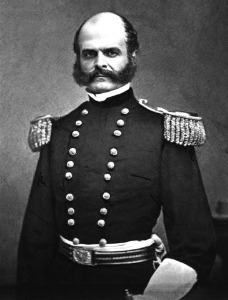
|
| General Ambrose Everett Burnside |
A horrendous slaughter of Federal troops took place when General Burnside was ordered by McClellan to get his troops across Antietam Creek immediately, and Burnside chose frontal attacks over a narrow stone bridge crossing the Antietam as the way to get there. Because of the creek's flow along the base of the mountain, once the bridge was crossed under constant sniper fire, the troops faced a sheer embankment which had to be climbed into the face of 500 Confederate sharpshooters shooting down from the top. Burnside and the Federal troops finally did accomplish this suicide mission after four hours of trying, mostly because the Confederate sharpshooters ran out of ammunition. At the end of that day, 23,000 troops on both sides were casualties. Toward the end of the war, similar casualties would be sustained fifty miles north at Gettysburg PA, along a branch of the Monocacy on the east side of the ridge. The two Monocacy streams, Creek and River, are entirely distinct but a natural source of confusion.
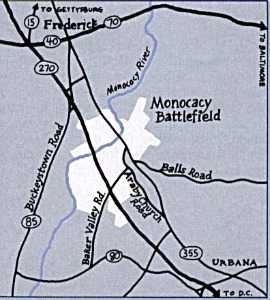
|
| Monocacy River Map |
It would seem a pity, however, to succumb to a fit of tidiness and change the name of either stream. The Shawnees were once the most important Indian tribe in this region, and at various times have achieved dominance over regions from the Delaware River to Oklahoma. As a major component of the Algonquin federation of tribes, they fought a losing battle with the Iroquois over a period now named the Sixty Years War, eventually retreating from the Eastern Alleghenies to Ohio. Meanwhile, the Iroquois were destroyed by the consequences of the Revolutionary War, while eventually, the Shawnees retreated to reservation areas in Oklahoma. The Monocacy streams, both of them, represent a high-water mark of Shawnee influence. It would be sad to see the last few vestiges of their pre-eminence, even if only names on a map, destroyed by inadvertence or indifference.
Franklin Declares Independence a Year Early
Joseph Priestly became a close friend of Benjamin Franklin almost as soon as they met. Priestly was an Anglican clergyman who broke loose and formed the Unitarian Church, and meanwhile, his scientific discoveries also entitle him to be called the Father of Chemistry. Franklin, of course, was the discoverer of electricity; it would be hard to be sure which of the two was more brilliant. In July, 1775, Franklin wrote the following letter to Priestly, which makes a trenchant case that the American colonies should, and would, break away from England. Since some legal authorities, following Lincoln's lead, maintain that Jefferson's manifesto "informs" the United States Constitution, it might be well to begin referring to this letter as an even clearer statement of the mindset of America's founding leaders.
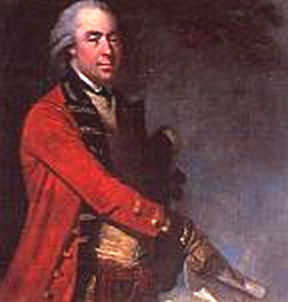
|
| General Thomas Gage |
" Dear Friend (wrote Franklin),
"The Congress met at a time when all minds were so exasperated by the perfidy of General Gage, and his attack on the country people (i.e. Of Lexington and Concord), that propositions of attempting an accommodation were not much relished; and it has been with difficulty that we have carried another humble petition to the crown, to give Britain one more chance, one opportunity more of recovering the friendship of the colonies; which however I think she has not sense enough to embrace, and so I conclude she has lost them forever.
"She has begun to burn our seaport towns; secure, I suppose, that we shall never be able to return the outrage in kind. She may doubtless destroy them all; but if she wishes to recover our commerce, are these the probable means? She must certainly be distracted; for no tradesman out of Bedlam ever thought of increasing the number of his customers by knocking them on the head; or of enabling them to pay their debts by burning their houses.
"If she wishes to have us subjects and that we should submit to her as our compound sovereign, she is now giving us such miserable specimens of her government, that we shall ever detest and avoid it, as a complication of robbery, murder, famine, fire, and pestilence.
"You will have heard before this reaches you, of the treacherous conduct to the remaining people in Boston, in detaining their goods, after stipulating to let them go out with their effects; on pretence that merchants goods were not effects; -- the defeat of a great body of his troops by the country people at Lexington; some other small advantages gained in skirmishes with their troops; and the action at Bunker's-hill, in which they were twice repulsed, and the third time gained a dear victory. Enough has happened, one would think, to convince your ministers that the Americans will fight and that this is a harder nut to crack than they imagined.
"We have not yet applied to any foreign power for assistance; nor offered our commerce for their friendship. Perhaps we never may: Yet it is natural to think of it if we are pressed.
"We have now an army on our establishment which still holds yours besieged.
"My time was never more fully employed. In the morning at 6, I am at the committee of safety, appointed by the assembly to put the province in a state of defense; which committee holds till near 9, when I am at the Congress, and that sits till after 4 in the afternoon. Both these bodies proceed with the greatest unanimity, and their meetings are well attended. It will scarce be credited in Britain that men can be as diligent with us from zeal for the public good, as with you for thousands per annum. -- Such is the difference between uncorrupted new states and corrupted old ones.
"Great frugality and great industry now become fashionable here: Gentlemen who used to entertain with two or three courses, pride themselves now in treating with simple beef and pudding. By these means, and the stoppage of our consumptive trade with Britain, we shall be better able to pay our voluntary taxes for the support of our troops. Our savings in the article of trade amount to near five million sterling per annum.
"I shall communicate your letter to Mr. Winthrop, but the camp is at Cambridge, and he has as little leisure for philosophy as myself. * * * Believe me ever, with sincere esteem, my dear friend, Yours most affectionately."
[Philadelphia, 7th July, 1775.]
REFERENCES
| The Invention of Air: A Story of Science, Faith, Revolution,and The Birth of America, Steven Johnson ISBN: 978-1-59448-852-8 | Amazon |
Beaumarchais: A Playwright Brings France into the American Revolution
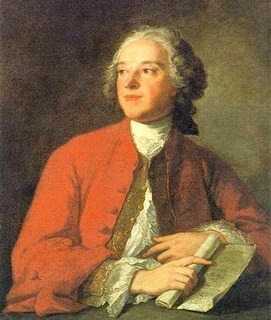
|
| Pierre Augustin Beaumarchais |
Pierre Augustin Beaumarchais, the son of an 18th Century French watchmaker, was born Protestant in a Catholic country. While possibly inclined by this circumstance to be a free thinker, his unusual artfulness was more likely inborn. After revolutionizing watchmaking before he reached the age of twenty, with an escapement mechanism for small portable watches, he rose to social attention when the Royal Watchmaker claimed the invention was his own, and Beaumarchais sued him. Thus gaining Louis XV's notice, Beaumarchais became Royal Watchmaker himself. He was soon giving harp lessons to the ladies of the court, writing plays like The Barber of Seville, and engaging in business schemes with wealthy investors. His career as a court favorite lasted sixteen years, first bringing him considerable wealth, but then sudden ruination by a lurid lawsuit which cost him his fortune. In brief, Beaumarchais had tried to bribe a French judge with less money than his opponent offered, and so spent a few months in prison. After concluding a long, public battle through the appeals courts, he sought a more political role with the new young King, Louis XVI. He was sent to London to pay off a former French Agent, Chevalier D'Eon, who was blackmailing the French government. D'Eon's social connection to John Wilkes, the outspoken critic of the British King, sparked Beaumarchais' initial interest in Whig politics and the American rebellion.
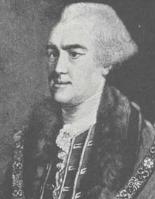
|
| John Wilkes |
When he arrived in England Beaumarchais found British politics in turmoil; John Wilkes headed a whiggish opposition movement denouncing Royal authority and hosting gatherings of the like-minded, some of which Beaumarchais attended. Fueling these domestic British flames of liberal reform was the recent and increasingly serious rebellion on the other side of the Atlantic. As Beaumarchais spent more time in England discussing the rebellion with Virginian Arthur Lee (who highly exaggerated its strength), he became increasingly convinced it would be a good strategy for France to help the colonists. For all the trouble Arthur Lee ended up causing, he can fairly claim credit for enlisting Beaumarchais to French support for the American cause.
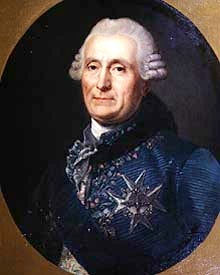
|
| Charles Gravier, Comte de Vergennes |
Beaumarchais reported his findings to Charles Gravier, Comte de Vergennes, the foreign minister of France. He urged the French government to support the American rebellion, consistently taking the line of French self-interest; after suffering a humiliating defeat in the Seven Year War, France might now undermine England's growing regional power by helping the colonists loosen their affiliation to the rising island empire.
When the young and hesitant Louis XVI finally agreed to take Beaumarchais' advice, it was still unclear whether the American rebellion was a serious movement. The French monarchy was not ready to unsettle its already shaky relationship with England by coming out in public support of untested rebels. To preserve the appearance of neutrality, the French Government loaned Beaumarchais one million lives in June 1776 to start a private trading firm, the Rodriguez Portales Company. This new firm would buy old French military supplies from the French government, then re-sell those supplies to the Americans with return payment of American products, primarily tobacco. Beaumarchais was therefore expected to run a completely self-sustaining operation, free from association with the French government. Rogue and adventurer that he was, Beaumarchais took on this risky challenge with enthusiasm, working tirelessly in France and around Europe to provide the Americans with ammunition, military supplies, and food. His efforts did not go undetected, however. England's ambassador to France, Lord Stormont, grew suspicious of Beaumarchais' frequent trips across the channel and notified the French government of his displeasure. But Beaumarchais simply ignored these protestations.
Matching Beaumarchais' work in establishing Rodrigez and Hortalez, the American Congress sent a covert representative to nurture French support. Silas Deane, sent to France under the disguise of a colonial merchant in July 1776, learned of Beaumarchais' plan to support the American army and at first, the two became fast friends. Unfortunately, this friendship sparked the jealousies of Colonists and Frenchmen alike. Arthur Lee became a particularly vicious opponent of the Beaumarchais/Deane pair, resenting Silas Deane for having been chosen over him as a diplomat to the French, and suspecting Beaumarchais of money laundering. Even when he was later sent in company with Benjamin Franklin to continue negotiations with France, Lee remained suspicious of Deane and Beaumarchais' collaboration. The American mission to France during this period remains famous for strife and factionalism, which was as much a free for all as two-sided animosity. Personal ambition and cultural differences complicated these relationships; no one eventually suffered more because of it than Beaumarchais and Deane.
While Deane negotiated with Beaumarchais, Arthur Lee corresponded with Congress to undermine both Beaumarchais and Silas Deane. Lee was highly suspicious of both men, accusing them of using the privateering scheme for their own profit. The result was a split in Congress between those who supported Lee and those who supported Deane's work with Beaumarchais. The first congress was full of alliances, tempers and faulty information that led to frequent, if not constant, conflict. The Lee brothers were particularly vocal opponents of an alliance with France, and this opposition by a prominent family within the Continental Congress kept French and American relations strained and hesitant.
The first shipment to the colonies by the Rodrigez and Hortalez Company carrying nearly 25,000 pounds of ammunition, was a shaky and often blind operation. Continental Congress never received news of Deane's plans (and request for ships) and remained busy working away at a proposed Declaration of Independence, the publication of which would, with luck, ensure France's official cooperation. Deane was forced to make crucial shipment decisions without the support or approval of Congress. Adding to this instability, the ships were discovered by Lord Stormont right before the first shipment left for the colonies, and the English Ambassador to France quickly protested their sailing to the French government. Vergennes, eager to keep smooth relations with England, particularly in view of the seeming failure of the American cause at that time, officially banned their sailing off the French coast. Fortunately for the Americans, Beaumarchais sent the supplies anyway, which were greeted warmly by colonists in Portsmouth, New Hampshire in early 1777. These supplies helped the colonists win the Battle of Saratoga, the success of which finally convinced the French to emerge in full support of the American Revolution. Beaumarchais continued to supply the Colonists despite England's protests, but privateering increased the threat of war between England and France.
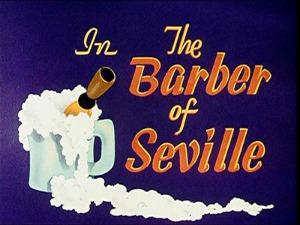
|
| Barber of Seville |
By September 1777, Beaumarchais had shipped 5 million lives worth of supplies to America without repayment. By 1778 his firm had accrued so much debt that by the end of the war it was in complete ruin. The French government was unwilling to acknowledge its support for Beaumarchais before or after the war, and Silas Deane's entreaties were, unfortunately, not enough to convince Congress that the American colonies owed Beaumarchais for his generous work. Beaumarchais continued his requests for compensation after the war, and Congress continually refused or ignored these requests. Thirty-six years after his death, his heirs were paid back a small fraction of the original debt. Forced to travel to Congress to fight their ancestor's case, his descendants were awarded 800,000 lives of the several million owed. In effect, Beaumarchais nearly single-handedly supplied the American Revolution with arms receiving very little in return except his financial ruin.
It is surprising that a man with so much talent and character should have died in near obscurity; yet Beaumarchais' plays, not his political maneuverings, are what have survived today as part of the standard repertory. When his wildly successful The Barber of Seville premiered in 1775, Beaumarchais was already a well-known playwright and champion of the down-trodden common man. Perhaps he was too great for his own time; The Barber proved more popular when adapted into a libretto by Lorenzo Da Ponte and then later into an opera by Gioachino Rossini in 1814. An independent mind and flamboyant character immortalized his art, but the same characteristics may have brought him, and France, to political and financial ruin.
State in Schuylkill Fishing Club
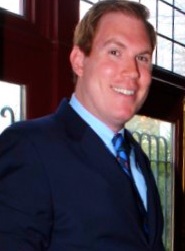
|
| Richard Romm |
Richard Romm, a rising historical scholar with a special interest in early Philadelphia, recently educated the Right Angle Club in the history of the Schuylkill Fishing Club in the State in Schuylkill, and was immediately accepted into membership. Of the Right Angle, that is, which is an old club by some standards, but scarcely a hundred years old in the eyes of the really old, old clubs.
The State in Schuylkill is an eating club, originally a fishing and eating club, apparently organized around the annual shad run up the river. The clubhouse, or Castle, was moved several times, in response to damming of the river, and is now located on the grounds of, or adjoining the edge of, Nicholas Biddle's estate on the Delaware River called Andalusia. One by one, the Atlantic Ocean rivers of America have been dammed and their annual shad migrations brought to an end, except through the city of Richmond, Va, so there was little point in moving The Castle to follow the fish. It remains, overlooking Delaware in spite of its name.
There seems to have been several name changes, the most important of which was to change the Colony of Schuylkill to the State of Schuylkill for obvious reasons. Originally, the Castle was roughly opposite the falls of Fairmount on the West Bank of the Schuylkill at about Girard Avenue; thus, from 1732 to 1822 located on Baron Warner's property called Eaglesfield. In 1822 it moved to Rambo's Rock (the Rambo family is said to be the oldest European settler family in Pennsylvania) opposite Bartram's Gardens, then finally in 1887 to Andalusia, Nicholas Biddle's country estate. The club was founded in 1732, and dates of movings are possibly hazy, possibly somewhat because of the reluctance of club officers to return the calls of inquiring historians. The State in Schuylkill claims to be the oldest organized men's club in the world, an honor contested by White's in London. The roots of this argument are found tangled in the vital issue of whether their age should be based on the formal organization of the clubs, or on the establishment of the coffee houses which housed the original clubs. Four books are said to have been written about club history, but we depend here on Mr. Romm.
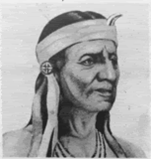
|
| Chief Tammenend |
There is also an unclear relationship with Chief Tammenend, possibly traceable to the shad run, but in any event to the Indian chief depicted with William Penn in the paintings by Benjamin West and Edward Hicks. May 1 is St. Tammany's day, growing into the fancy that he was the "Patron Saint of America", before a branch of the nation-wide Tammany association opened in New York and sort of tarnished up the name. Other traditions of the Fishing club have to do with wearing Mandarin hats, possibly having to do with the export of ginseng which was once abundant in our colonial suburbs, with a return cargo of Chinese dishware. All of the cooking is done by official citizens of the club. The quantities of food are remarkable; one 19th Century menu listed eleven pounds of meat per member. The club drink is a punch, the famous Fishhouse Punch, widely recognized to be rather strong. Its inventor is reputed to be Edward Shippen Willing, on the occasion of the first visit to the clubhouse by women guests. The quantity of alcoholic beverage at these events is especially remarkable in view of the Quaker origins of many original members of the club, but not necessarily of the guests. Among the various guests were Generals Grant, Meade, and McClellan. Dinner begins with two traditional toasts: to George Washington, and to Captain Sam Morris. Washington was appropriate enough, having a history of drinking a bottle of Madeira every day at lunch. But Sam? Captain Sam the Quaker?
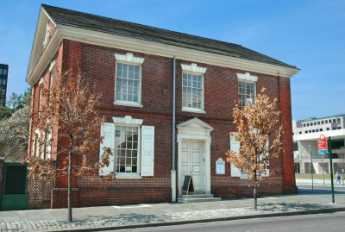
|
| Free Quaker Meetinghouse, Fifth and Arch Streets |
Somewhere in this tradition are allusions to the Free Quakers, Quakers who abandoned the peace testimony to fight the British. There is also the tradition of hostility to British rule which antedates the Revolution and may have some connection to the fanciful contention that their little state was not really part of Penn's colony. Captain (of the City Troop) Sam was a stalwart, possibly the sole founder, of the Gloucester (N.J.) Fox-hunting club. The history is passed down that 22 of the original 26 members of the First City Troop were members of the fox-hunting club, and many if not most were Quakers. The first "Governor" of the State in Schuylkill was Thomas Stretch, but the second Governor, from 1766 until his death, was Captain Sam. He was repeatedly referred to as the life of the club and held in the highest esteem by all. He was "read out" of the main Quaker Meeting, not so much for his drinking as for his flouting of Quaker belief in pacifism. He reputedly led a saber charge at the Battle of Trenton and was a leader of the City Troop in that revolution within a revolution at James Wilson's house, which rescued at least four future signers of the Constitution from a mob of militia which momentarily turned Jacobin.
Naturally, descendants of Quakers on both side of this uproar have been reluctant to say much about it. But somewhere within the history of Samuel Morris must be some important clues about the 18th Century splits within the Quaker Church, to say nothing of the revolt of the three Quaker colonies against British rule.
Espionage in the Revolution
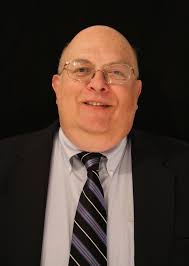
|
| John Nagy |
Both sides fighting the Revolutionary War predominantly spoke English as a native language, so it seemed deceptively simple to pick up a little cash for a tidbit of information or two. John Nagy, who has written several books on spies in the Revolution, recently addressed the Right Angle Club about this interesting topic. According to him, Quakers were favorites as spies because they were widely split in their sympathies, and as pacifists were abundant in the civilian societies of the time. Others have commented that the main difference between Conservatives and Free Quakers was that the Free Quakers were mostly of the artisan class and sympathetic to the Revolution, while the Conservatives were mainly of the merchant class, and Tories. But there were many exceptions, and the plain dress Quakers were hard to tell apart and passed freely through the military lines. No doubt many readers will be incensed by such comments, for which we take absolutely no responsibility.
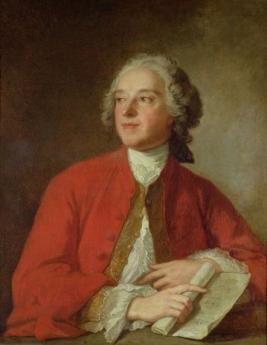
|
| Beaumarchais |
The one main exception to the English-language generalization were the French, who were still smarting from their defeat in the Seven-Years (French and Indian) War. The playwright Beaumarchais was quite active in the French movement to make trouble for the hated English and seems to have stirred up King Louis XVI to be interested in financing rebel trouble-makers, if not to become active combatants. In any event, a wary King thought it was best to send a spy to look over the situation. As detailed in a little pamphlet called The Spy in Carpenter's Hall the Americans were tipped off about the plot. Accordingly, the spy named Bonvoloir was hidden up on the second floor of Carpenter's Hall, while the colonists put on a belligerent falsified performance on the first floor. It is claimed their performance was a convincing one, having the desired effect of creating a report to the King that the colonists were belligerent, warlike, numerous and united. After the Battles of Trenton and Saratoga, the timing was good for using this sort of report to provoke the King into doing what he was mostly of a mind to do, anyway.
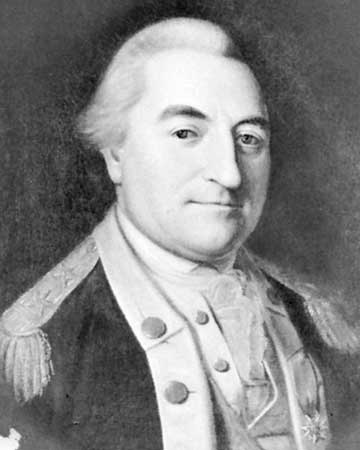
|
| Johann de Kalb |
The French were unusual in favoring aristocrats as spies and Johann de Kalb was anther who snooped around, returning later in the form of General de Kalb of military note. The names of British spies, aside from Major Andre, tended to have a Quaker sound to them, like Dunwoody, Cadwalader Jones and the like. It would take deep research to know whether these were Quaker stalwarts or merely black sheep of some family; there is little doubt that sympathies changed with the changing fortunes of battle. Another feature was the careless lying which took place for propaganda purposes. The famous story of Lydia Darragh, a Quaker who allegedly overheard the British officers plotting the surprise attack on Whitemarsh on December 5, 1777, and walked many miles in the snow to warn Washington -- is apparently a much dressed-up version of what happened. The whole Darragh family was engaged in regular spying, and the evidence is that Lydia's brother William was the one who was the messenger. He apparently carried messages under the cloth covering of the buttons on his coat.
.jpg)
|
| Joseph Galloway |
Two types of spying have a greater ring of authenticity. The British needed pilots to guide their ships up the Delaware past fortifications and obstacles. Maps were nice, but it seemed simpler to enlist the efforts of two ladies of easy virtue, Ms. O'Brien and Ms. McCoy, to hang out in taverns and entice local ship pilots to enlist to guide the British ships into Philadelphia. The British spymasters even had the ingenuity to entice a member of the Continental Congress, Joseph Galloway, to turn over the commentary records from which troop strength could be estimated from the food consumed. It is not recorded whether suitable adjustments were made for starving troops, stolen supplies, or fraudulent charges, however.
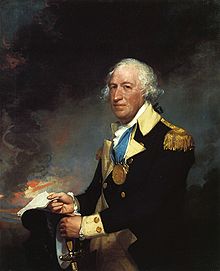
|
| Benedict Arnold |
Two prominent officials were accused of selling out the side, but an accusation of this sort is easily made, hard to prove. When the examples of Benedict Arnold and Peggy Chew can be verified, however, there is always doubt cast on everyone which some will believe. The system of double signatures was used, so there were two co-treasurers of the United States, Joseph Hellegas and George Clymer. Letters have been produced indicating that one or the other sold the commissary records. Hellegas' home is still today the residence outside Pottstown of a prominent Philadelphia surgeon, and his portrait appears on the ten-dollar bill. In so doing, he started a tradition of Secretaries of the Treasury on the ten-dollar bill, presently occupied by Alexander Hamilton. George Clymer, for his part, was a signer of the Constitution and a favorite of George Washington. Are these stories true? Who knows, but in an eight-year war, John Nagy has accumulated evidence that there were over five hundred documented spies. The essential question remains one of whether to believe the documents.
The King's Road
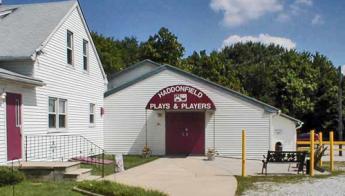
|
| Plays and Players of Haddonfield |
Harry Kaufman may not have started the Plays and Players of Haddonfield, but he certainly sparked it to a near-professional level in a town of 7000 people. The orchestra and the ballet company are particularly outstanding at the moment, the soloists on the stage quite good, although they never made the grand European tour which is thought to be the prerequisite for getting into the big time. Harry was the life of any party, and particularly good at composing little ditties, never quite getting around to stringing them together into a musical comedy until the 250th anniversary of the town. Even then, it is recalled he was shy and reluctant and had to be pushed a little. Since The King's Road appeared shortly after Oklahoma! transformed, even revolutionized, American musical comedy, it was not only the model but the stimulus for a similar comedy celebrating the beginnings of our little state. The plot was a simple one of a conflicted love affair. The striking innovation of Oklahoma! was to crowd most of the show's songs into the first act, repeating snatches of their themes as sort of Wagnerian background commentary throughout the remainder of the play. The other innovation of what was originally called Green Grow the Lilacs was the addition of Agnes DeMille's ballet company to emphasize the real historical theme with light-hearted music. Since I was one of the original reviewers for Oklahoma! in its New Haven tryouts, I can remember the revolutionary impact of that play, very well.
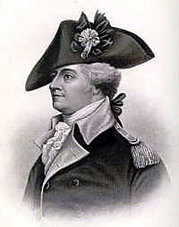
|
| Anthony Wayne |
Harry had to go to the Historical Society for authentic details of the conflict between the attraction for Revolutionary aspirations for Liberty, and loyalty to the earlier sufferings of Quakers for their pacifist leanings. Some Quakers deserted their faith to join the Revolution, and other Quakers tried to convert the Hessian soldiers. And still, others were loyal to the King of England. The Revolution was almost won at this moment, as the British occupants of Philadelphia had abandoned their supplies to attack, and had to get to the British fleet, bottled up in the lower Delaware River by fortifications at Fort Mifflin and Fort Mercer on the Jersey side of the river. The Hessians had been sent to attack Fort Mercer from the rear, passing through Haddonfield and stopping one night before going on to what we now call National Park. While the Hessian officers were being entertained by John Gill with discussions of the futility of war, Jonas Cattell slipped out of town and ran to alert Fort Mercer of its danger. The guns of the Fort were turned around, and the defenders pretended not to notice the approach of the Hessians until they were ambushed and largely destroyed. If Fort Mifflin on the Pennsylvania side of the Delaware River could have held out, the starving British might have had to surrender, but that didn't happen. In any event, the New Jersey Militia did its part, and little Quaker Haddonfield helped them in a sort of characteristic Quaker way. With a ratta-tat-tat and a fiddly dee, the rag-tag swallow-tail Jersey Militia got all the credit.
The play does not emphasize that the State of New Jersey was founded at the Indian King Tavern during these commotions, or that General Washington starving at Valley Forge sent Mad Anthony Wayne to circle up and around Trenton to drive a herd of cattle back from Salem County, two hundred miles back to Valley Forge. The British sent Captain Simcoe down to Salem County to massacre the Quaker farmers who provided the cattle. These later developments are only mentioned in its anthem to "Generals Wayne, LaFayette, and Pulaski", and every good resident of Southern New Jersey is supposed to know what that is all about.
The Quaker historian Rufus Jones established the enduring tradition that this split is what ultimately reduced the Quakers from the dominant religious group to a small religious sect in the three states once owned by William Penn, Delaware, Pennsylvania, and New Jersey. Related to such turmoil was the claim that more battles of the Revolution were fought in New Jersey than in any other state; if you include the large privateer navy going to see from the Jersey Pine Barrens, that is probably true. And every twenty-five years or so, we have to put on a revival of "The King's Road", and just show 'em.
| Posted by: mundopolis | Mar 25, 2012 1:30 PM |
I wanted to resolve the problem and called their customer support number 517-639-0760, but I reached their answering machine.
From the message I found out that the best way to contact them would be through e-mail support@infosystemplates.net
I wrote a letter about my problem to the noted e-mal address, and within 15 minutes I received a reply that the situation will be reviewed, and in about 5-8
hours, I will receive a notice to my e-mail, and then, during 72 hours they will make a refund.
Today I have received a refund and want to take back all the claims for InfoSys Technologies LLC.
The mistake was corrected very fast, and they have shown themselves as a serious business partners.
Besides, I got a free version of their product as compensation.
Good work, keep it up!
| Posted by: salamder | Apr 20, 2008 3:51 PM |
11 Blogs
The Wyoming Massacre of July 3, 1778
 As the dominant Indian Tribe in Eastern America, the Iroquois were ruthless in war. Whether egged on by the British or for their own reasons, in 1778 they remorselessly wiped out the Connecticut settlers around Wilkes-Barre.
As the dominant Indian Tribe in Eastern America, the Iroquois were ruthless in war. Whether egged on by the British or for their own reasons, in 1778 they remorselessly wiped out the Connecticut settlers around Wilkes-Barre.
Sullivan's March
 With Washington beleaguered at Valley Forge, an Indian massacre of the nearby Wyoming Valley was a serious threat from the rear. General Sullivan was sent to exterminate the Iroquois, and proved utterly ruthless.
With Washington beleaguered at Valley Forge, an Indian massacre of the nearby Wyoming Valley was a serious threat from the rear. General Sullivan was sent to exterminate the Iroquois, and proved utterly ruthless.
William Allen, Tory
 History is written by the victors, so the rich Tory William Allen is largely forgotten. But he was Chief Justice, probably the richest man in the colony, the son in law of Andrew Hamilton and the father in law of John Penn, the Proprietor, and Governor.
History is written by the victors, so the rich Tory William Allen is largely forgotten. But he was Chief Justice, probably the richest man in the colony, the son in law of Andrew Hamilton and the father in law of John Penn, the Proprietor, and Governor.
Pembertons
 One of the oldest, most prominent Quaker families contained a multitude of famous, rich, distinguished leaders. Many suffered imprisonment or exile for their pacifism, but one Pemberton is the highest-ranking wartime general buried in Laurel Hill Cemetery. He was a Confederate.
One of the oldest, most prominent Quaker families contained a multitude of famous, rich, distinguished leaders. Many suffered imprisonment or exile for their pacifism, but one Pemberton is the highest-ranking wartime general buried in Laurel Hill Cemetery. He was a Confederate.
Lansdowne
 John Penn, the last of the Penn Proprietors, lived in a mansion near what is now Horticultural Hall in Fairmount Park.
John Penn, the last of the Penn Proprietors, lived in a mansion near what is now Horticultural Hall in Fairmount Park.
Monocacy Creek and Monocacy River
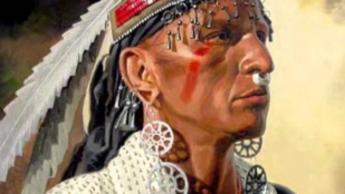 An ancient Shawnee Indian word causes confusion along the Blue Mountain.
An ancient Shawnee Indian word causes confusion along the Blue Mountain.
Franklin Declares Independence a Year Early
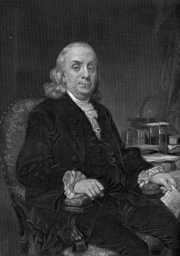 Franklin made no secret of his goal of national independence, at least a year before the Continental Congress voted and Thomas Jefferson composed his rather rambling declaration.
Franklin made no secret of his goal of national independence, at least a year before the Continental Congress voted and Thomas Jefferson composed his rather rambling declaration.
Beaumarchais: A Playwright Brings France into the American Revolution
 Pierre-Augustin Beaumarchais, the author of the classic opera, The Barber of Seville was also a crucial financial and ideological supporter of the Revolutionary War.
Pierre-Augustin Beaumarchais, the author of the classic opera, The Barber of Seville was also a crucial financial and ideological supporter of the Revolutionary War.
State in Schuylkill Fishing Club
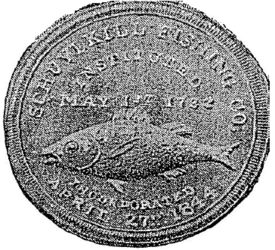 Unless you listen to some quibbles from White's in London, the Schuylkill Fishing Club of the State in Schuylkill is the oldest organized men's club in the world. And even if that exception is admitted, it's the oldest men's club in America. It's no secret, but it's very private.
Unless you listen to some quibbles from White's in London, the Schuylkill Fishing Club of the State in Schuylkill is the oldest organized men's club in the world. And even if that exception is admitted, it's the oldest men's club in America. It's no secret, but it's very private.
Espionage in the Revolution
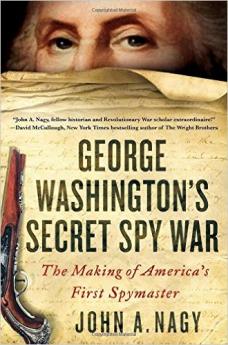 Almost everyone in the American Revolution could speak English, so it is not surprising to hear of many spies.
Almost everyone in the American Revolution could speak English, so it is not surprising to hear of many spies.
The King's Road
 It's only been performed fifteen or twenty times, but Hayyr Kaufman's musical comedy captures the real spirit of Olde Haddonfield.
It's only been performed fifteen or twenty times, but Hayyr Kaufman's musical comedy captures the real spirit of Olde Haddonfield.
Discuss Restaurants
Discuss Life
Discuss poetry
Basically, you can Discuss everything here II
\/